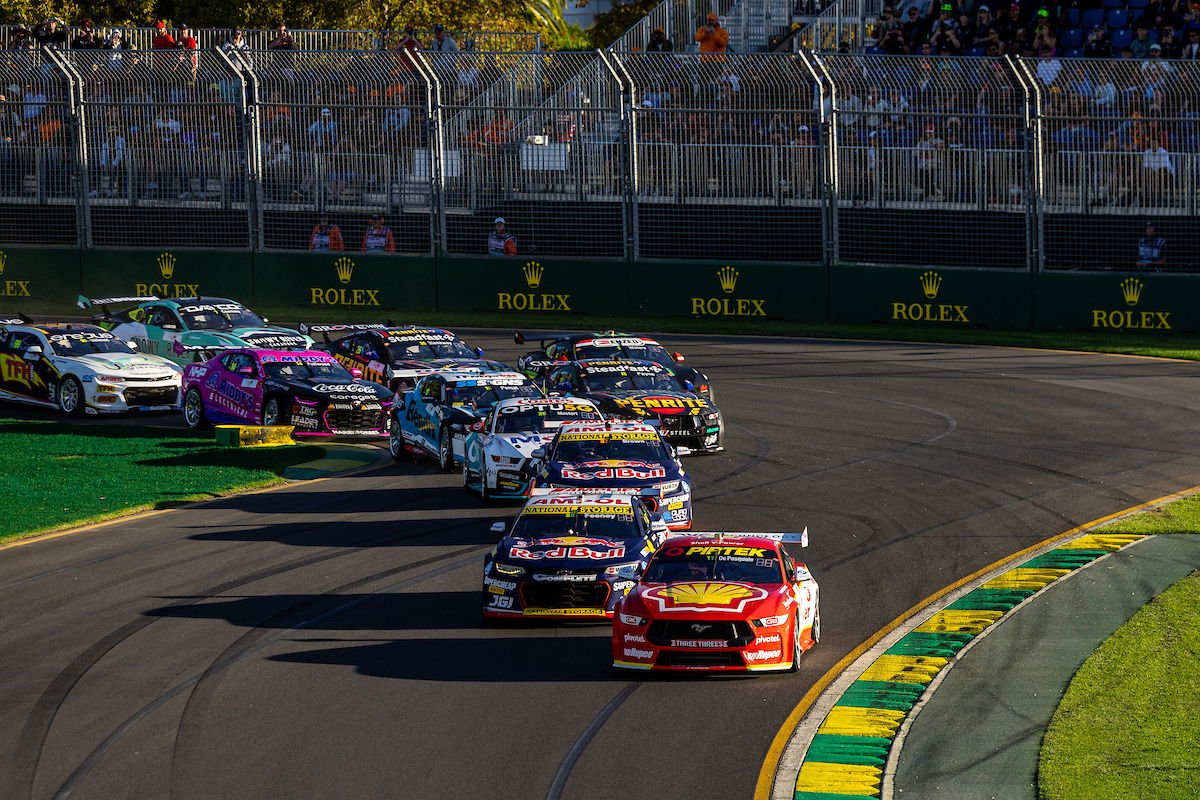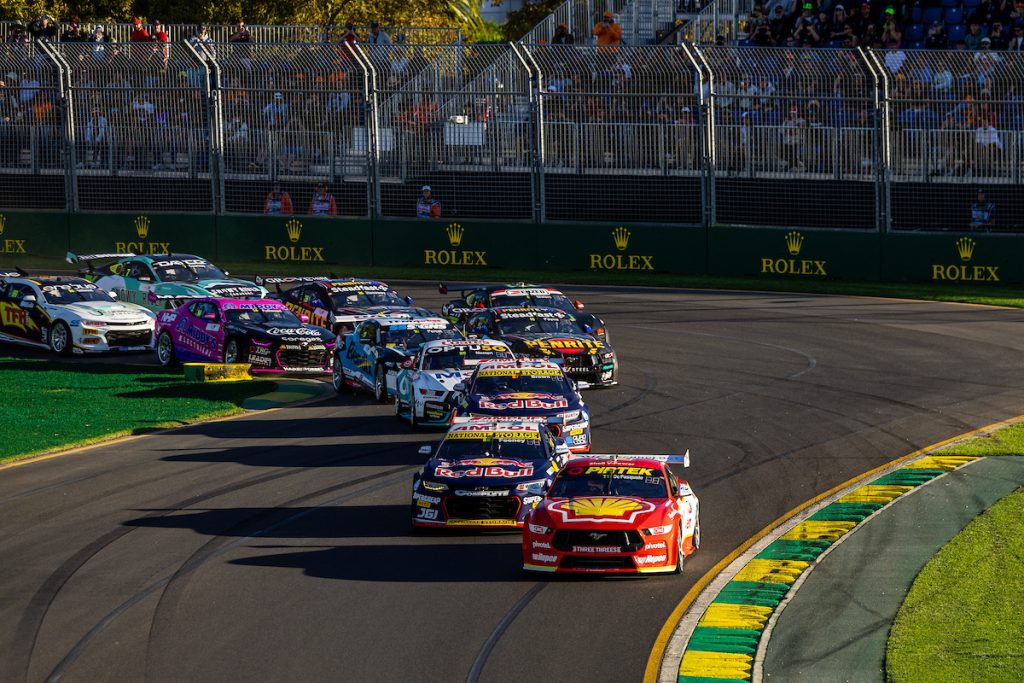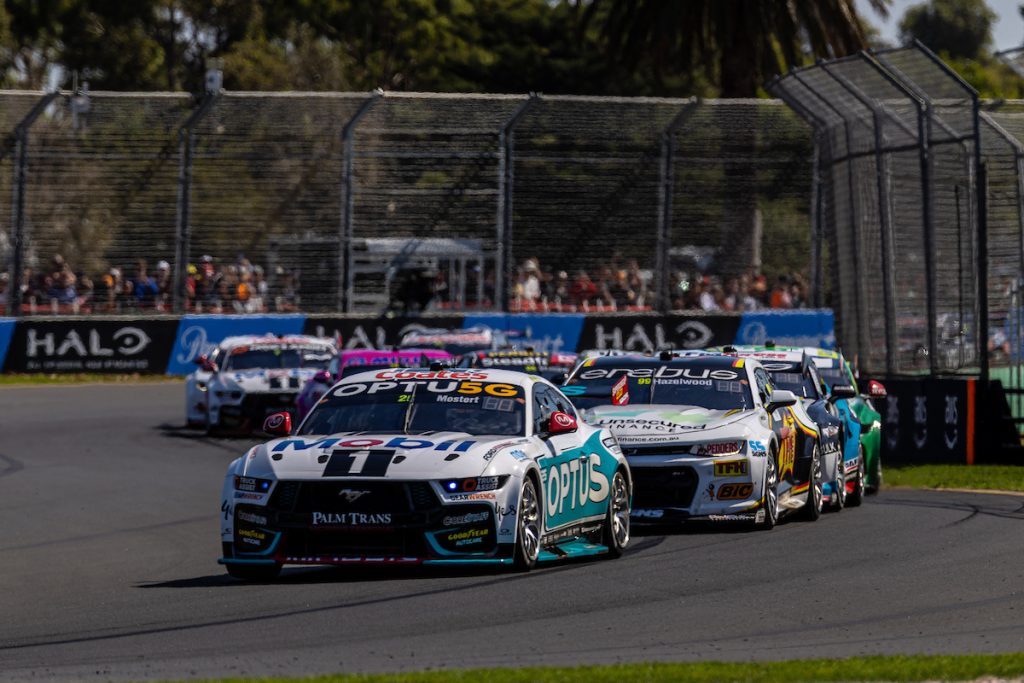

With Supercars bumped from the secondary pit lane garages, the four races at the Australian Grand Prix were run as pure sprints, a near-20-year first so far as racing for championship points was concerned.
Come the end of the weekend’s second race, Team 18’s Mark Winterbottom, who finished second in that heat, was even more effusive, although he identified tyre degradation and a high-stakes qualifying task as other factors.
“I think the tyre degrading’s big,” said the 2015 Supercars champion.
“I think also the fact that you don’t pit… Because, normally, if you’re behind someone, they bring you in to short fill or long fill and put you in a gap and you artificially pass them.
“Also, qualifying is out of sync because one lap, you’re getting guys out of place effectively. It’s making a big difference too.
“But, when you want to pass someone, you’ve got to pass them on track, and that’s a lot different to an engineer telling you, ‘We’ll get you out early, clean air,’ just cruise around and pass 10 cars in the pits if you’re fast enough. It’s all done on track.
“So, I think the non-pits, although controversial, I think it’s mega for the racing.
“There’s always pros and cons to some decisions [but] if people are disappointed with that race then, you know, you’re hard to please, because it’s really good.”
The Red Bull Ampol Racing driver said, “The no pit stops, I think everyone’s having a really big crack straight away from the start, and it’s making it exciting for the racing.
“I think you saw how urgent Matt Payne was trying to get past on Cam, so I think everyone’s enjoying it this weekend.”
Walkinshaw Andretti United’s Chaz Mostert, however, is not.
The Mobil 1 Optus Mustang pilot prefers the strategic element, and the ability to change one’s destiny on the run.
“I don’t know, I’m getting old so I’m more of an enduro driver now than the sprint races,” quipped the 31-year-old.
“So, I don’t like all these young whippersnappers that have got their eyes open, or even when Dave Reynolds has a Froot Loop moment and he turns into a young buck too.

“So, I like the calmer races and a bit of strategy comes into it and, you know, getting the engineers under pressure and then in the pits, and getting to work out things that can change your outcome of the race.
“I had a bad start today [Saturday’s Race 5], ended up fifth; really, on-track, I was going to finish fifth until two cars went out and I finished third.
“Other than having a big crack at Will, there wasn’t a lot going on at the pointy end.”
Broc Feeney, who spent much of the weekend racing with Triple Eight team-mate Brown, noted that the simpler format is easier to follow for fans trackside.
“I suppose this one’s a bit different to normal; four sprint races,” he began.
“I’m not going to lie, we’re not all driving flat-out for 19 laps of racing still; we’ve still got to manage it a little bit.
“I think probably towards the [scheduled 14-lap] race that we had today, everyone was flat out and pushing for those certain amount of laps.
“You still do have to manage yourself a little bit out there so it’s not a 100 percent flat-out effort, the whole race.
“I think you’ve seen both myself and Will manage the races from the front, so look, I am enjoying it, for sure.
“We do enjoy the long races – it’s a lot of fun when everyone’s on a bit different strategy – but, look, for the fan on the hill, it’s very easy to watch.
“You know who’s leading, who’s not, there’s not pit stops to mix everything up, but there’s still some things to fine-tune.”
“I’ve long maintained that we overcomplicate our racing much of the time, with rules like the minimum fuel drop,” he wrote.
“Last weekend showed that pure, unadulterated, races should play a part in the Supercars season.”
However, a minimum of two pit stops (and change of two tyres) is still compulsory.
There are compulsory pit stops in every other race still to come in 2024 except for the enduros, although refuelling will be necessary in the Sandown 500 and Bathurst 1000, and there is also the possibility of brake pad/rotor changes (which may be mandated through supplementary regulations).



















Discussion about this post